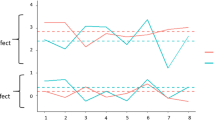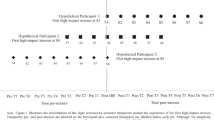Abstract
The 1-week stability of Beck Depression Inventory (BDI) scores in a college population was examined. The most recent version of the BDI, in which respondents are instructed to rate the items with respect to the past week, was employed. The test-retest reliability coefficient was 0.64. Scores on the initial administration were significantly higher than retest scores (8.52 vs. 7.05). More than half of the individuals scoring in the depressed range (BDI > 10) on the first test fell into the nondepressed range (BDI < 10) 1 week later. Of the students who scored above 10 on the first BDI, those with high rather than low life event scores were significantly more likely to have their BDI score fall below 10 at the second testing session.
Similar content being viewed by others
References
Beck, A. T., Rush, A. J., Shaw, B. F., & Emery, G. (1979).Cognitive therapy for depression. New York: Guilford Press, 1979.
Beck, A. T., Ward, C. H., Mendelson, M., Mock, J., & Erbaugh, J., (1961). An inventory for measuring depression.Archives of General Psychiatry 4 561–571.
Brown, G. W., & Harris, T. O. (1978).Social origins of depression. New York: Free Press.
Bumberry, W., Oliver, J. M., & McClure, J. N. (1978). Validation of the Beck Depression Inventory in a university population using psychiatric estimates as the criterion.Journal of Consulting and Clinical Psychology 1978,48 150–155.
Depue, R., & Monroe, S. M. (1978). Learned helplessness in the perspective of the depressive disorders: Conceptual and definitional issues.Journal of Abnormal Psychology, 87 3–20.
Hammen, C. L. (1980). Depression in college students: Beyond the Beck Depression Inventory.Journal of Consulting and Clinical Psychology, 48 126–128.
Hatzenbuehler, L. C., Parpal, M., & Matthews, L. (1983). Classifying college students as depressed or nondepressed using the Beck Depression Inventory: An empirical analysis.Journal of Consulting and Clinical Psychology, 51 360–366.
Oliver, J. M., & Burkham, R. (1979). Depression in university students: Duration, relation to calender time, prevalence, and demographic correlates.Journal of Abnormal Psychology, 88 667–670.
Sacco, W. P. (1981). Invalid use of the Beck Depression Inventory to identify depressed college-student subjects: A methodological comment.Cognitive Therapy and Research, 5 143–147.
Sacco, W. P., & Hokanson, J. E. (1978). Expectations of success and anagram performance of depressives in a public and a private setting.Journal of Abnormal Psychology, 87 122–130.
Zimmerman, M. (1983). Using personal scalings on life event inventories to predict dysphoria.Journal of Human Stress, 8 32–38.
Author information
Authors and Affiliations
Rights and permissions
About this article
Cite this article
Zimmerman, M. The stability of the revised Beck Depression Inventory in college students: Relationship with life events. Cogn Ther Res 10, 37–43 (1986). https://doi.org/10.1007/BF01173381
Issue Date:
DOI: https://doi.org/10.1007/BF01173381




